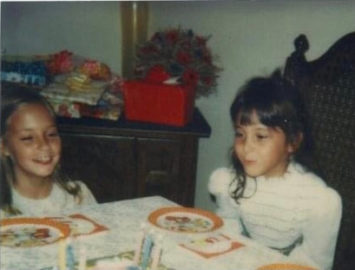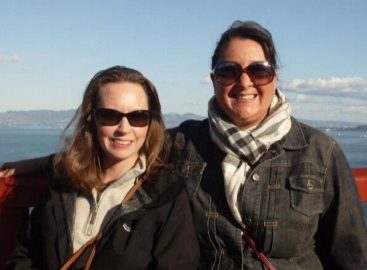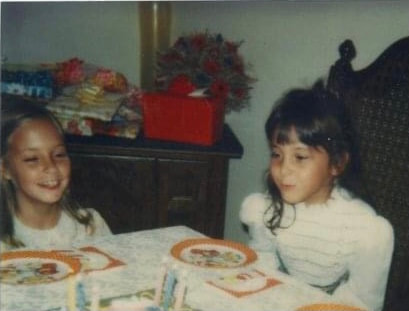by Brooke Gillespie-Trout and Colleen Osborne
What happens when two sisters from a blended family talk about how their family comes together across differences?
During this time of year as we give thanks for our loved ones and have family gatherings, it’s not uncommon for conversations to get tense. We all have different points of view on sensitive subjects. It’s a question to ponder throughout the entire year, not just for the month of November. Do we brush our differences aside, or do we do the inner and outer work to come together and work through those differences?
In this blog post you’ll meet Connected Realities team members Colleen Osborne and Brooke Gillespie-Trout. Step-sisters, never allowed to refer to one another as “step” anything, who grew up together in a loud, boisterous family. As much as their family loved to talk, Colleen and Brooke realized that their family wasn’t so good at communicating.
What started out as an interview where they answered the same questions, ended up being therapeutic for both of them.

Brooke – I don’t think there is any one particular thing I would change, because I believe the experiences and circumstances molded me to be who I am, molded all of us to be who we are. If I were to do anything differently, I would spend more time together, because as we’re getting older, it’s so apparent that time goes by quickly and I would savor all of those loud holidays, and the chaos leading up to the parties… scratch that… I’ll never like getting that big house ready for a party. But I would really immerse myself into those times and hold onto those feelings.
Colleen – I would try to be kinder and offer others – and myself – more grace. Being more aware of the impact of my actions on others would have been helpful. I wish I’d known how to express what was bothering me and make requests for what I needed. Overall, I would have tried to have a wider view of the situation, by considering others’ opinions and needs and bringing empathy for their experience.Earlier on, what was challenging?
Brooke – For me, being the youngest of four, I always felt challenged personally because I didn’t get the same grades that my siblings did, and I often felt stupid and inferior. Not because of anything anyone in our family said to me or how they made me feel, but teachers who had my sisters as students compared me to the two of them all the time. It was a challenge because I never felt smart. I actually had one teacher look at me and ask me why I couldn’t get the same grades as my sisters. (Shame on that teacher!) My grades got me into so much trouble. I was grounded all the time because of them and I never understood that. Grounding me didn’t suddenly make me understand algebra. “Oh, ok. I can’t go out with my friends this weekend. Now I get it! I get what X equals! All it took was grounding me!”
Colleen – During adolescence, I had feelings of inferiority and a bit of a Cinderella complex. I didn’t feel like I was as pretty or popular as Brooke and our other sister, Krissy. I didn’t have the same relationship with Mom that Brooke and Krissy did – which I suppose was inevitable – but at the time, it left me feeling insecure. Given that we weren’t allowed to use the word “step” or talk about being anything other than one big happy family, we weren’t able to address and overcome whatever issues were there. Later on, what was challenging?
Brooke – Keeping up at Christmastime. Mom set the bar high with decorating, making sure Santa visited, and the gifts, Dad set the bar high with meals. Once I moved out, I realized how much of an introvert I am. With the way Mom and Dad entertained, that wasn’t allowed, so I grew up learning how to be not only social, but gracious to others when really all I wanted to do was get into sweats, eat snacks, and read books. Once I became a parent, that introvertedness became heightened. I didn’t know if I had it in me to make a big deal about the holidays, but I also didn’t want my kids to grow up without those experiences.
And now that I think about it, it wasn’t just the holidays. It’s how involved Mom was with everything. I wasn’t like that as a mother when it came to school functions, I went to the other extreme. I attended only those functions that I absolutely had to attend.
Colleen – After Mom died, we had to reconstruct ourselves as a family. I feel like we were like a hollow shell of a family – kind of like a façade. We wanted to come together but didn’t know how. We couldn’t just start to build the deeper relationships we wanted until we talked some things out. We had to learn some skills for having hard conversations, skills that we didn’t have earlier on. I feel like the hollow outline has filled in a lot over the years.
What experiences can you remember where our family did, or did not, come together across differences? What either enabled or got in the way of coming together?
Brooke – To be completely honest, I didn’t see a lot of this growing up. Coming together across differences. Especially when it came to politics being discussed around the dinner table. Tensions would become high and voices were raised to get points across. Afterwards, there was never any apologizing or hearing each other out. It was, “This is why I’m right and you’re wrong” and then the topic was dropped.
Even when it came to sibling arguments, Mom didn’t make us sit down and talk it out. She just said, “Apologize and get along.” End of story.
I think what got in the way of coming together across differences is maybe our parents weren’t raised in households where they communicated and talked things out. Therefore, that wasn’t instilled in the way we were raised. Now that I’m older I really see the importance of communication and how powerful it is.
Colleen – I agree with Brooke. It’s hard to come together across differences when you can’t acknowledge the differences. Ultimately, I think we came together across differences some years after Mom died. It took a long time and a lot of personal growth and self-acceptance. I can say this was the case for me for sure, but I think it was true for all of us to a degree. When we have come together, it was through greater self-acceptance, empathy for others, and forgiveness.
What was your childhood experience of growing up in this blended family?
Brooke – Overall, it was good. I was the youngest of four, so for me life felt easy. I wish Today Me could have had a chat with Then Me because I would have told her to step up more than once. But since that isn’t a possibility, when I look back on it all, I was happy and carefree.
I can remember a time when Colleen and I were at the mall and someone from school came up to me and I introduced her as my sister. This person was shocked. I remember her looking between us, because obviously we don’t look alike, and she said, “Wow. I didn’t realize this was your sister, I thought she was your friend.” When this person left, Colleen looked at me and said, “I’m your friend, too.” It was truly at that moment that she taught me that siblings can and should consider each other friends.
Colleen – I was happy as a child, but somewhat insecure. After going from being the baby of a family to being a middle child, I wasn’t sure where I fit in. I loved having sisters; we played Barbies, school, beauty pageant, and The Love Boat endlessly. I had a loving, if distant relationship with my new Mom – at least until my first boyfriend came along and then things got rough. Really rough.
What is your experience as an adult in this blended family?
Brooke – Once Mom died, I really understood that she was the glue that held us together. Maybe not emotionally, but at family gatherings and holidays, she was the one who made sure we showed up and told us it was important to spend time together. I’ve often thought about writing a book titled, “When The Glue Is Gone” about how life felt when she was no longer here.
What I’ve learned as an adult, and in her absence, is that we’re all the glue. It’s up to all of us, not just one of us, to band together and spend time together and continue to make those memories.
Colleen – My adult experience of the family started with a period of estrangement after I married that first boyfriend. There were a number of years where I didn’t see Brooke, Krissy, or Mom at all. When I found the chutzpah to get out of the bad marriage, I then had to heal the relationship with my family. An apology and admitting I was wrong went a long way to making things better.
Now I feel secure; these relationships feel more solid and less tenuous. I can be me in all of these relationships. I also feel like we as a family don’t need to meet anyone else’s standards. We can just be who and what we are, an imperfect Brady Bunch family.
So, what can our experience as a blended family that struggled to come together across differences offer to anyone who feels challenged with this? We have gleaned the following wisdom from our experiences:
- It is important not to harbor ill will toward anyone. Forgiving people for what may or may not have done earlier in life is healing, both for the forgiver and the “forgivee”.
- We have taken up the challenge to strengthen bonds with the family members we have left. Everyone in the family has to be part of the glue that holds us together.
- Nothing lasts forever and it is never too late to build or strengthen relationships. When Colleen was estranged from the family, she couldn’t believe she was there and she couldn’t see the way out. No matter how hard the situation might be, there is a possibility for healing and reconnection.
- Building the skills to have difficult conversations will pay dividends for families. When you can talk about your hurts and needs, those things can be addressed.
Although our blended family experience was not perfect, we are choosing to honor the beautiful intentions of our parents – to build a family in which our different histories and lack of shared parentage was immaterial. We move forward, though, realizing that we have to acknowledge and talk about differences in order to overcome them.

Colleen and Brooke, 2012
